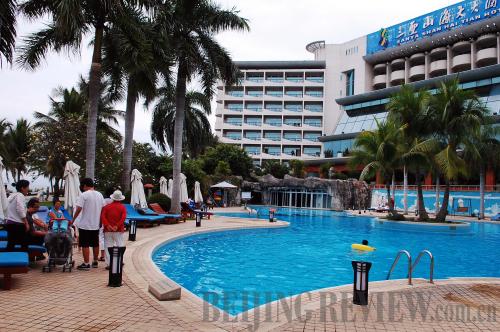|
 |
|
HOTEL BOOM: Tourists enjoy the pool area at the Shanhaitian Hotel in Sanya, Hainan. The island is home to 259 star-rated hotels, including 20 five-star hotels, to cater to a growing number of travelers (WANG HUIYU) |
The tropical shores of Hainan are luring surfers and resort-goers, all seeking to escape their city lives for a quiet stretch of beach and sunshine. But now the island has come under the spotlight for a different reason—a property rush raising prices to levels comparable to Beijing and Shanghai.
Deep-pocketed investors from across China's mainland have rushed to snatch up houses, many paying in cash. Sanya, a beach resort on the southern edge of the island and home to a number of five-star hotels, saw its average house price double to around 20,000 yuan ($2,929) per square meter in January this year.
The property boom has prompted big developers to scoop up pristine beachfront plots to lock in future returns. In December 2009, China Railway Real Estate Group agreed to pay an astronomical 1.68 billion yuan ($246 million) for a plot of land in central Sanya, the most expensive land transaction on the island.
With crystal clear seas and palm-lined beaches, it is not difficult to see why people choose Hainan as the spot for their second or third home or even for retirement. Adding fuel to the property fire was excessive nationwide liquidity as state banks opened lending floodgates to shore up the economy.
But what really inflated the bubbles was a government program to turn Hainan into an international tourist destination by 2012. In addition to an array of measures to boost infrastructure and services, the island also received a green light to tap into sports lotteries and open more duty-free shops for departing foreign tourists.
In the five days following the government initiative announcement, house purchases on the island province were comparable to sales throughout the whole year in 2008.
The woes of the property crash 10 years ago seem to be fading from memory, and only a few unfinished buildings along the streets still serve as reminders of what the island has experienced.
Once a sleepy agricultural backwater area, Hainan became the country's youngest province and special economic zone in 1988. But the economic boom was quickly followed by reckless property expansion that churned out more office towers than could be leased for years to come. Apartments often changed hands several times while still in the design process.
The bubble eventually popped in 1993 after the government tightened mortgages and interest rates, leaving thousands of projects half-finished and banks burdened with bad debt.
Since then the island economy was mired by inactivity until a recent tourism boom provided an effective cushion. Still, analysts are cautious concerning the potential for a second property crisis.
Estimates hold that at least 470 billion yuan ($68.8 billion) in hot money has already flooded into the island for speculation—10 times that in the 1990s.
By suspending land sales and approvals for new building projects on the island in January 2010, policymakers tried to tame the property explosion. Previously, the authorities also required a 40-percent down payment for a second home and subjected developers sitting on unused land to tough penalties. Nevertheless, the buying spree has shown few signs of easing since a virtuous self-reinforcing cycle of optimism has been set in motion.
"There is a modest slowdown in sales increase due to short supplies, and prices are still hovering around peak levels," said Real Estate Consulting Co. Ltd. General Manager Tang Huanglong.
"An increasing number of people from north China are staying in town for the winter, and they need to rent or buy houses," said Tang.
Hidden dangers
Despite a staggering jump in house prices, many analysts are surprisingly calm about the possibility of a devastating collapse.
Unlike a decade ago, the current price hikes have enough pent-up demand to support them, though mostly from investors hoping to flip homes for a quick profit, said Chi Fulin, deputy to the 11th National People's Congress (NPC) and Director of the Hainan-based China Institute for Reform and Development, on the sidelines of this year's NPC session.
Aside from this, risks have largely been held at bay since most purchases have been financed at a low level of debt, he said.
Yu Jinhua, a senior analyst with the Huatai United Securities Co. Ltd., agreed. "Most importantly, policymakers are now less likely to prick the bubble as they did 10 years ago," said Yu.
| 